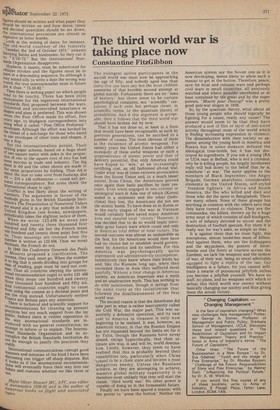The third world war is taking place now
Constantine FitzGibbon
The youngest active participants in the second world war must now be approaching the age of fifty, and nobody aged less than thirty-five can have any but the most childish memories of that horrible second attempt at global suicide. Fortunately there are no 'laws of history,' but there seem to be certain psychological constants, not ' scientific ' certainties if such exist but perhaps closer, in scientific terms, to the quantum theory of probabilities. And if this argument is acceptable, then it follows that the third world war should have broken out by now.
That it has not done so, at least in a form that would have been recognisable as such by previous generations, can be ascribed to a number of causes. The most obvious of these is the existence of atomic weapons. For twenty years the United States had either a monopoly of these awful weapons or such a preponderance of atomic power and then of delivery potential, that only America could have hoped to win,' at an 'increasingly • terrifying cost, an old fashioned all-out war. Under what was at times extreme provocation from the Soviet Union and, to a much lesser extent, from China, the Americans proved once again their basic pacifism by their restraint. Even when engaged in neo-colonial or ideological wars in Asia one of which (Korea) ended in a stalemate and the other (Indochina) they lost, the Americans did not use the atomic bomb. To have done so in Korea or in the early stages of the war in Vietnam would certainly have saved many American lives and ensured local victory.' However, it was decided that to do so would imply inevitably great future wars which could end only in American total defeat or total victory. The second outcome was almost as undesirable as the first, for the Americans would then have had no choice but to establish world government by America and its satellites. For this America was psychologically quite unprepared and administratively incompetent. Instinctively they knew where their limits lay and, like the Romans long ago, when they exceeded them in Asia they suffered most painfully. Without a total change in American society, an American imperium was a myth and an unattractive myth. This has nothing to do with isolationism, though it springs from the same roots as the isolationism that followed the dissillusionment of the first world war.
The second reason is that the Americans did take part in what is rather inaccurately called the Cold War, the major part. This was essentially a defensive operation, and its vast cost to America in treasure is only now beginning to be realised. It was, however, an American victory, in that the Russian Empire has not expanded beyond the limits set for it by Yalta, though the Russians have never denied, except hypocritically, that their ul timate aim was, is and will be, world domination. Lately, however, they seem to have realised that this is probably beyond their capabilities too, particularly since China !ceased to be a client state and became a most 'dangerous enemy. Unless the Russians. .achieve, as they are attempting to achieve, massive global military superiority it is therefore most unlikely that they will start the classic 'third world war.' No other power is capable of doing so in the foreseeable future. Finally we have been spared a maniac with the power to 'press the button.' Neither the American system nor the Soviet one as it is now developing, seems likely to allow such a maniac to get at the button. Therefore, peace, save for local and colonial wars and perhaps civil wars in small countries, all anxiously watched and where possible smothered or at least contained by the great and by the super powers. ' Mourir pour Danzig?' was a pretty good anti-war slogan in 1939.
So, by the quantum theory, what about all those young people who should logically be fighting for a cause, really any cause? The answer would seem to be that they have produced a sort of film or layer of anti-social activity throughout most of the world which is finding increasing expression in violence. The dissatisfaction with their society so apparent among the young both in America and Russia has in some measure defused the ideological time-bomb, but it has not destroyed its ingredients. If you ask a young IRA or UDA man in Belfast, who is not a criminal, why he is killing people, his largely incoherent reply will boil down to the belief that he is, somehow at war.' The same applies to the members of Black September, the Angry Brigade, German anarchists, considerable elements in the United States, self-styled 'freedom fighters' in Africa and South America, the lbo who killed and died and those who did the same in Bangladesh. There are many others. None of these groups has anything in common with the others save that they have turned to violence. They are the commandos, the killers, thrown up by a huge army most of which consists of dull hooligans, a sort of infantry devoted to soccer and the destruction of football specials. For them it is really war for war's sake, as simple as that.
It is against them that we must fight, this amorphous, almost leaderless mass of killers. And against them, who are the kidnappers and the skyjackers, the posters of letterbombs and the firers at tourists across the Zambesi, we lack the weapons and the system of war, of their war, being as usual admirably equipped to fight a replica of the last. Our intelligence is a failure, for you cannot infiltrate a swarm of poisonous jellyfish unless you become a jellyfish yourself. We have no staff, no plans, and no weapons with which to defeat this third world war enemy without basically changing our society and thus giving them the actual victory.


































 Previous page
Previous page